President's Message
I would like to take this opportunity to thank each and every one of you for your membership and to especially thank those who volunteer to support the Society.
We hope you will join us for the Society's 37th annual meeting. Dr. Louis Manarin, Historian/Author and Chuck Peple, Historic Preservationist/Graphic Designer, will speak on the 400th anniversary edition of "The History of Henrico County". Copies of this book will be available for sale and one lucky person will take home a copy from a raffle to be held at the meeting.
Proceeds from the raffle will benefit the Society's Magazine Fund. In years past, the society has published an annual magazine. The cost of publishing has increased in addition to an increase in postage. We are in the process of raising funds for this very important project. One generious donor launched the fund, and we hope to see the fund increase considerably. If you cannot attend the meeting and would like to purchase a $2.00 raffle ticket (or 3 for $5), contact me at 839-2407. If you would like to donate to the Magazine Fund, please make checks payable to HCHS and mail to HCHS Magazine Fund, PO Box 90775, Henrico VA 23273. The Society is a 501(c)3 tax exempt charitable organization. Donations are tax deductible as permissible by State and Federal law.
The Society is an all volunteer organization and receives no funding except that of membership dues and items we sell.
We have soemething new on the Society website at www.henricohistoricalsociety.org/shopping.html. We now have a PayPal account to make ordering online more convenient. You now have the option to use your credit card, or, as previously, order through the mail to have items delivered to your door. You can also sign up for new membership or to renew your membership with this feature.
We hope you will also join us for the second annual Cultsha Expo on June 23rd at the Science Musueum of Virginia. HCHS participated last year and collected more funds than at any other single exhibit. THe organization, CultureWorks, promotes Culturual nonprofits in the Richmond region and distributes grant funds at this event to those organizations.
For each registered person, free "Cultshabucks" will be issued to be used to make purchases or donations. At the end of the event, each organization can convert their collected "Cultshabucks" for real money. You get real stuff and we get real money.
Also something new this year is for each new registration online at http://www.richmondcultureworks.org/Home/CultshaXpo.aspx to be a Cultsha member before June 11, using the code HCHS, the Henrico County Historical Society, the Society will receive a $1.00 donation.
If 1000 people register, the Society will receive $1000.00. You do not have to be a Society member to participate so tell all your family and friends. And if they are not already HCHS members, maybe they would be interested in joining. Membership is only a click away on our website.
Best wishes,
Sarah Pace
President
>Back to Top<
Join HCHS at Cultsha Xpo!
Presented by Culture Works to spotlight the Richmond region's non-profit arts and culture organizations.
All you have to do is Register and/or Attend and you'll help the HCHS earn money!
- FREE admission to the Science Museum of Virginia.
- FREE performances from local arts and culture organizations including musical, visual art, theatrical, historical, dance, and more!
- MANY organizations for families to learn more about, classes, tickets, subscriptions, performances, education programs, and so much more from local participating arts and culture organizations.
- FREE money - CultshaBucks - for each cultsha member to use at the event, with any of the participating organizations.
Cultural Shareholders (also known as cultsha - cultural shareholders) is a way to celebrate, connect, share, and strengthen arts and culture in the Richmond region.
You can directly help the Henrico County Historical SOciety receive financial support. At the June 23rd Cultsha Xpo CultshaBucks ($10-$100, in $1.00 bills) will be provided to every registered Cultural Shareholder. CultshaBucks can be used just as real cash during the Xpo to purchase subscriptions, to renew memberships, to buy tickets, to make a general donation, to register for a class, etc.
REGISTER, ATTEND and SPEND to help support HCHS because we will get $1 from CultureWorks for every $1 CultshaBuck received. In addition, this year, for every new registration online before June 23, using the code HCHS, the Henrico County Historical Society will receive a $1 donation. If 1000 people register, the Society will receive $1000.
Registration is available online at http://www.richmondcultureworks.org and onsite at the Cultsha Xpo.
>Back to Top<
Talk & Tour Highlight March HCHS Meeting at St. John's
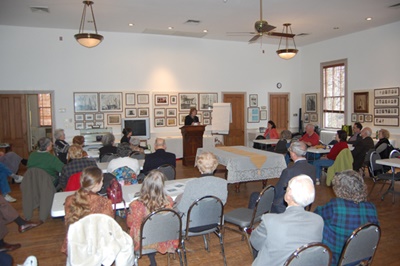
At the March meeting of the Henrico Historical Society, author Judith Sherman spoke on her book: The Burying Ground at Old St. John's Church: A Concise History with Fifty Family Profiles and a Parish Burial Register. Her presentation touched on the church's foundinh, its historical importance to Richmond and the United States, how the years have affected the church grounds and some information regarding historic and interesting people buried in the churchyard.
Afterwards, John King led a tour of the graveyard, identified significant and interesting grave sites and related anecdotes relevant to the churchyard.
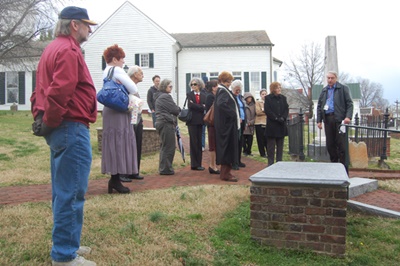
>Back to Top<
Purchase a Calendar, and a Printable Time Capsule of History
Our 2012 HCHS Calendar is still available for sale. It features: the first artillery on rails; distinguished African-American soldiers; reconnaissance by balloon; homefront activities; Jewish heroes; and much more!
It's more than a calendar; it's a study in history!
Visit www.henricohistoricalsociety.org/shopping.html to make an online purchase of your copy now. Be sure to check out the other items available. To place an order by phone, please call 804-839-2407. Calendar is $12.00 plus tax and shipping.
>Back to Top<
A Case of Manumission in Nineteenth-Century Henrico County
Izard Bacon's will made provisions for freeing his slaves; Virginia law made his wish rather problematic.
Manumission of slaves, it seems, would have been a fairly straightforward process. However, the case of Izard Bacon shows otherwise.
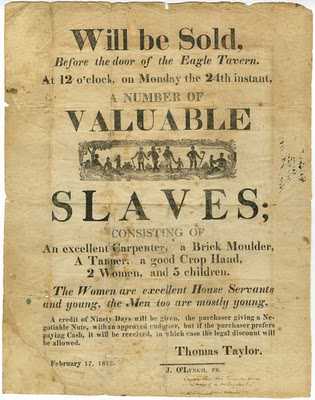
Captain Izard Bacon, a wealthy landowner in Henrico County in the early 1800s, left a will dated December 23, 1815. In that document he included the following item: "It is my will and desire that respecting my slaves and their increase, that they shall be emancipated, as soon as a law can be obtained giving them leave to remain in the State, and in the mean time, that they shall be disposed of in a way most consistent with their happiness, and so that the proceeds of their labour shall go to the support of the aged, infirm, and unfortunate. When Bacon died in 1816, the problem of freeing his slaves began. In Virginia at that time, it was illegal for a freed slave to remain in the state.
Heirs seemed to object to the freeing, so John Crenshaw, executor of the estate, filed a paper claiming: "the slaves comprehended in the said bequest that the laws of this Commonwealth, not admitting their remaining in it in a state of freedom they are willing and desirous to remove out of the Commonwealth so soon as a sufficient sum can be provided from their labour and the testator having provided that the profits of their labour are to be applied for their exclusive benefit the whole beneficial interest in them is disposed of to their own use, and neither the devisees nor next of kin of the testator can have any interest in them any control over their persons or right to the profits of their labour under these circumstances your orators and oratrixes humbly conceive that they are entitled to relief in equity though they cannot maintain their claim to freedom in a Court of Common law.
Crenshaw then declared that he was willing to carry the will into effect and asked, "that your orator and oratrixes may be declared emancipated by the decree of this Honorable Court and that Commissioners, agents, or trustees may be appointed for receiving their profits of labour, and removing out of the Country as soon as may be, the profits of their labour to be applied to this purpose and if any of your orators and oratrixes from age or infirmity shall be unable to remove that sufficient sum may be reserved, that your orators and oratrixes may have such other relief as is consistent with equity."
The court's decision concluded that "the plantiffs shall be emancipated, so soon as a law can be obtained giving them leave to remain in the state, and in the mean time that they shall be disposed of in any most consistent with their happiness, and so that the proceeds of their labour shall go to the support of the aged, infirm and unfortunate, that they should be hired out to such persons as they may prefer to live with until such an act be obtained, and that trustees should be appointed to act on their behalf, doth adjudge, order, and decree that Thomas Ladd, Samuel Crew, and Fleming Bates, who are hereby appointed trustees for and in behalf of the plaintiffs, and hire them out from year to year, paying reasonable attention to the inclinations of the plaintiff, in the choice of the persons to they are hired."
This covered the remaining slaves, one had died, plus five who had been born since the 1817 order, so they were hired out for anywhere from 90 dollars a year to a minimum of 8 dollars a year (for a "Rather weakly" 18 year old girl).
In 1819, Thomass Ladd paid 1200 dollars to remove slaves to Pennsylavania when Charles Granger, a nephew of Bacon, gathered the freed slaves and their goods and started for the Northern states with a view of taking them to Canada. They reached Columbia, Pennsylvania, and it seems, they stayed.
To resolve the conditions of the other slaves, he paid $250 in January 1820 for maintaining and clothing "an old man by the name of Dick" during his life, $20 to Joseph Henderson on June 9, 1820 to bear his expense in leaving Virginia and $10.25 to Mapey Bacon (slave) for her passage by steamboat to Baltimore on June 11, 1820.
However, for one of the free slaves, John Winston, life was not so happy. In 1820, he petitioned the Virginia Assembly to be able to return. His petition claimed that he was "induced from the love of Liberty (The predominant passion of man) to make a sacrifice of his domestic happiness, by quiting [sic] his Wife & two children whom he most ardently and tenderly loves - without whose society, he finds it impossible for him to be happy, & removed to the State of Pennsylvania, where has resided the last twelve months." He goes on to ask that "this Honorable body, when fully informed of this Character and good conduct through life, would feel some degree of sympathy fror him, and permit him again to return to the bosom of his family." Among the twenty subscribers to this petition was Thomas Ladd; however, the resolution of the petition is the subject of further research. We at the Henrico Historical Society welcome your help.
>Back to Top<
Cholera Strikes Richmond in Epidemic of 1849, Henrico Doctor Records Results for Board of Health
On November 12, 1850, Dr. Philip Claiborne Gooch, a celebrated Virginian physician from Henrico County, wrote a letter to potential subscribers of a new medical journal he was founding. His letter proposed that "the subscriber to embark in the responsible undertaking, and will issue the first "The Stethoscope" or "VIRGINIA MEDICAL GAZETTE" on the first of January, 1851. "The Stethoscope" went into publication and was in circulation for several years.
Perhaps Dr. Gooch's publication had been inspired by his experiences of the previous year when he served as the Secretary of the Board of Health in Richmond during the cholera epicdemic of 1849, one of three national cholera epidemics of the nineteenth century.
The city's population at the time was over 27,000, and the Board's final report of August 11 indicates that 147 of the reported cases were white, and 191 were "colored." While the numbers do not quite add up, the report claims that there were 143 dead, 128 cured or convalescing, and 73 that had not been reported. For over a month prior to the report, the Board held sessions Monday through Saturday at 5 o'clock. His minutes of the board's meeting give interesting insight into the medical theories, preventative measures of the day and living conditions in the city of Richmond.
On Saturday, June 2, 1849, according to Dr. Gooch's notebook, the Richmond Board of Health issued the following pronouncement:
Resolved, that, inasmuch, as the ordinance establishing a Board of Health has invested it with ample recommendatory powers; the Board will at once proceed to the exercise of the same & they do hereby recommend to the common council the immediate removal of the sturgeon benches and fish markets - the appointment of an inspector of fresh fish & crabs - the removal of all privies standing in any private or public street or alley - the daily removal of the sweepings from the market houses & the immediate removal of any such sweeping deposited on any unenclosed lot to some place beyond the limits of the corporation - the abatement of a nuisance back of the house known as the Pineapple church - the daily removal of all dead animals, fish, or other obstructions from the bed of Shockoe Creek.
Sturgeon in the river, privies in public streets and dead animals in an open Shockoe Creek - it was a far cry from modern-day Richmond.
Immediately, the Board went to work and issued recommendations to the citizens of the city. Under the heading "Report of a Committee of the Board of Health on Sanatory [sic] regulations and precautions, adopted by that body June 5th 1849," the Board recommended the following:
The removal of all impurities, animal and vegetables, from inhabited houses and their vicinities. The free use of chloride of lime, or lime of any sort, failing to procure the former in all closets and outhouses; also , in the cellars and closets of habitations. The lighting of fires in cellars at night, pans of lighted charcoal, with proper precaution, would be preferable. (Care should be taken not to use charcoal in any sleeping apartment.) The free ventilation of all apartments, best done at mid-day, by opening the doors and windows.
Applications should at once, in all cases of disease, particularly diarrhoea, be made to a physician. Let everyone avoid a resort to prescriptions cut from newspapers, since even when they do not positively inflict harm, much valuable time is wasted in their use; and, moreover, no one remedy can possbly be applicable to all cases.
Avoid the use of cold and acid drinks when the body is heated.
Avoid the use of acid fruits and vegetables. Under this precautionary head we would arrange pickles and pastry.
Avoid the use of alcohol and fermented liquors in excess.
Avoid excessive fatigue and exposure to dampness, especially at night.
Two [sic] much stress cannot be laid on the propriety of wearing flannel next to the skin.
Daily bathing should be practiced; where there is nothing to forbid it, cold bathing should be preferred.
It would be advisable for every one, if his habits be temperate, to avoid lowering the one of his system by resorting to too poor a diet, or changing his mode of life. Heavy or late suppers should not be indulged in.
In fine, let all undue excitement of depression of mind be avoided. Fear is particluarly a predisposing agent in the production of diseases of this character.
Personal cleanliness is inculcated as absolutely necessary.
Let each housekeeper place in his front doorway or passage a pan or dish, containing three parts of table salt, one part of manganese, wet with one part of sulphuric asic, at six o'clock in the morning, to be removed when the house is shut up.
By order of the Board,
P. CLAIBORNE GOOCH, MD.D.
While the report illustates some beliefs about diet, dress, behavior, and even mood, other reports offer curiousities. For instance, in its reports the Board kept a count of reported cases and their outcmes, and in one report citing 30 cases of cholera, the record stated, "The subjects of 17 cases were either intemperate or guilty of imprudence." Another report noted that "A case of a negro who died suddenly in the area came to the notice of the Board, but it was reported that the Coroner's jury have found a verdict of death by the visitation of God."
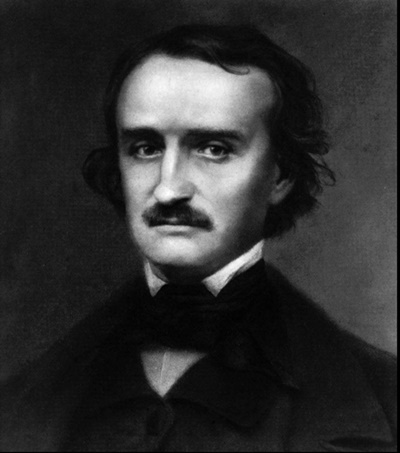
There was one case that was not part of Gooch's reports, and it is interesting to note that Edgar Allan Poe was in Richmond suffering what he believerd to be cholera during the outbreak. It was his last visit to his home town, and he died shortly thereafter in Baltimore. In a letter to his mother-in-law, Maria Clemm on June 7, 1849, he wrote:
I have been so ill - have had the cholera, or spasms quite as bad, and can now hardly hold the pen...The very instant you get this, come to me. The joy of seeing you will almost compensate for our sorrows. We can but die together. It is no use to reason with me now; I must die. I have no desire to live since I have done "Eureka," I could accomplish nothing more. For your sake it would be sweet to live, but we must die together. You have been all in all to me, darling, ever beloved mother, and dearest, truest friend...I was never really insane, except on occasions where my heart was touched...I have been taken to prison once since I came here for spreeing drunk; but then I was not. It was about Virginia."
When the epidemic ended in August, the final bills of the Board were presented. Among the charges totaling 90 dollas was $.75 for a notebook, $6.25 for advertising the resolutions in the four Richmond newspapers, $2.04 to Elisha Pllard for supplying ice for 51 days at $.04 per day and a payment of $66.00 to Dr. Gooch for his 22 days of service at $3.00 dollars per day.
While Dr. P Claiborne Gooch survived the 1849 cholera epidemic, he would only live for six more years. It is rather ironic that he succumbed to yellow fever in Portsmouth, Virginia in September 1855.

>Back to Top<
Now You Know: The Original Crank Caller
A magneto was responsible for powering the original crank caller.
Perhaps, we should have added the clue "Sarah, would you get me the Bluebird Diner?" to the last issue's "What Do You Know?" No one was able to identify the magneto that was found inside the old wooden crank telephones like the one Sheriff Andy Taylor used in "The Andy Griffith Show."
The magneto was directly connected to the crank on the outside of the telephone box. When the crank was turned, the magneto produced an electrical charge that rang the bell on your phone and on those on your party line.
A person's "number" would be a certain number of long rings and short rings. So to make the long ring, you would turn the crank for 3 or more seconds while you would only turn the crank for one or two seconds to make a short ring. Their number could be a long, a short, two longs.
In other cases, cranking the phone alerted the operator that someone was on the line and he (before Mayberry's Sarah, operators were male) would connect you to the party you requested.
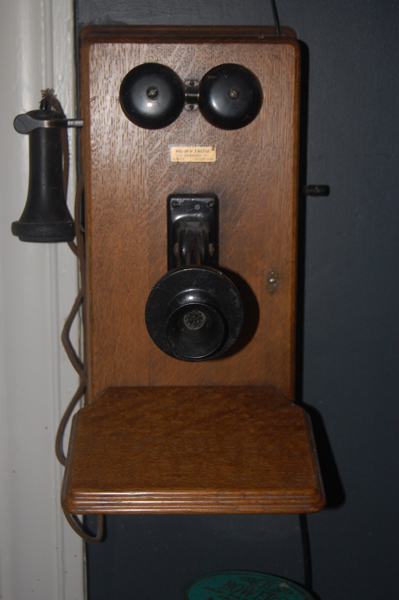
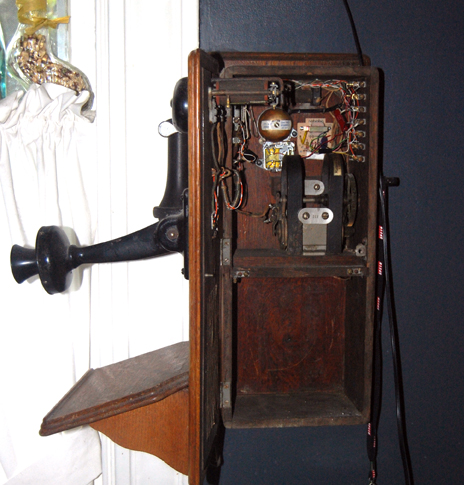
>Back to Top<
What Do You Know?
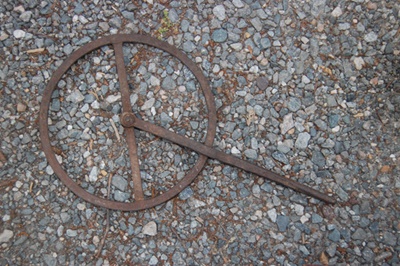
This hand-forged iron object is roughly 15 inches long. The circular part is approximately 9 inches in diameter.
Do you know what it is?
Email your answer to jboehling@verizon.net.
>Back to Top<
News 2012: Second Quarter
First Quarter | Third Quarter | Fourth Quarter
Home | Henrico | Maps | Genealogy | Preservation | Membership | Shopping | HCHS
|











